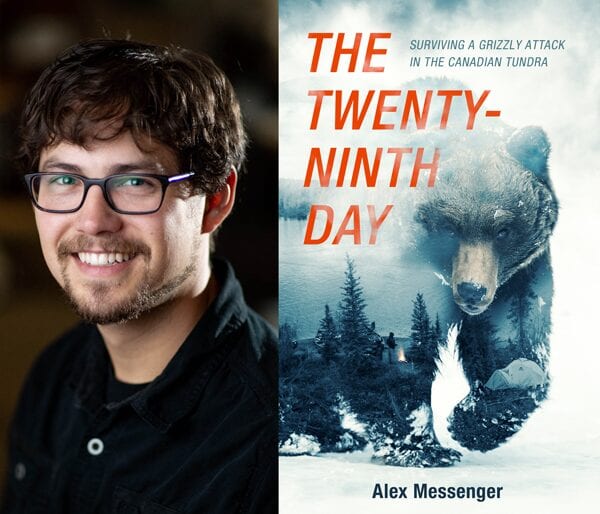Each day leading up to the 32nd annual Minnesota Book Awards announcement, we’ll be featuring an exclusive interview with one of our 36 finalists.

Interview with Alex Messenger, author of The Twenty-Ninth Day: Surviving a Grizzly Attack in the Canadian Tundra, part of the Memoir & Creative Nonfiction category, sponsored by Bradshaw Celebration of Life Centers
How does it feel to be a Minnesota Book Award finalist?
I’m so excited to have my book on this list. It’s pretty surreal, and means a lot to me to have The Twenty-Ninth Day recognized in this way. Everyone who submitted a book put so much into the piece, and it’s really fulfilling to have mine selected as a finalist.
Tell us something about your finalist book that you want readers to know?
The Twenty-Ninth Day is a memoir, survival story and an adventure story. This book is about surviving a grizzly attack, but it’s really about how quickly things can change, and doing your best in challenging situations. I hope that it offers something a little different for each reader. I don’t want to prescribe what each person’s takeaway should be, but it’s my hope that everyone who reads The Twenty-Ninth Day comes away with an appreciation – for wild places, for the things they have in life, for their friends and family, and for life in general.
Share something about your writing process and preferences. For instance, where is your favorite place to write?
It’s not unique, but writing for me truly is a process. It’s important to recognize that your first draft is not going to be your final draft. I prefer to write in the morning, often before the sun rises, in a dark room with no lights on – just the glow of my keyboard and screen. It’s in that environment that I’m best able to focus, without distractions, my mind projecting into the dark. Then it’s up to me to translate that to words on the page.
For this project specifically, with it being a piece of nonfiction—my own story in memoir—I began by creating a source document from which to work. To do that, I transcribed the journal that I’d kept on that trip and expanded it as I did so, writing down every memory and feeling that came to me. It was an onerous process, and the result, after transcribing and turning it into prose, was roughly 200 thousand words. From there, I worked to trim it down, distilling the text until only the essentials remained. It’s an inefficient process, but it lets me be creative in putting down words so I can inject some magic into the text. After that, the edits and rewrites let me get it trimmed to the best of what’s there.
Minnesota has a reputation as a state that values literature and reading. In your experience, what is it about our state that makes it such a welcoming place for writers and book creators?
I think Minnesota in general is just a very welcoming place, with people who will give you the time and are interested in what you’re doing. When you add onto that that we have a climate that’s conducive to people spending extra time doing indoor pursuits during the winter, I think you have a culture that’s open and readers who are ready to be transported through books and stories.
What do you love about libraries?
Libraries provide endless possibilities. Libraries offer access to nearly limitless human knowledge and experience. There are no or very low barriers to access to books and records, and the reach of collections extends beyond the walls of the individual library itself. The amount you can learn through a library is limited only by your individual ambition and dedication to keep pursuing a goal.
Alex Messenger is an author, a wilderness guide, and a volunteer search-and-rescue operator. His work has appeared in multiple publications. He lives in Duluth.

